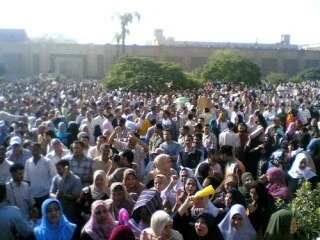Egypt And The World Food Crisis
On Sunday (April 6) the workers in Egypt’s largest (and government-owned) factory in Wahallah called for a general strike in protest against spiralling food costs.
Egypt is the world’s largest consumer of bread per capita and 40 per cent of the population live on less than two dollars (£1/1.20 euro) per day. Over recent months the price of bread in private, as oposed to government subsidised, bakeries has risen by 500 per cent, the price of dairy is up 40 per cent and cooking oil is up 20 per cent. Seven people have recently died in queues for subsidised bread from exhaustion or fights.
The strike was, however, called off in the face of police intimidation with plainclothes officers inside the factory preventing any gathering of workers. This, in turn, led to riots involving thousands of workers.
News of these events spread to Cairo where demonstrations of soldarity and protest were held. Due to authoritarian restrictions on freedom of assembly, passed by the the pro-US dictator Hosni Mubarak, all demonstrations and strikes without a permit from the government are illegal. Several hundred people were arrested, including women and children.
Mubarak has been in power since 1981 and was a major supporter of the first US-led war on Iraq. He is heavily reliant on the US for financial and diplomatic backing. Over the past two years, pressure has steadily been increasing on his regime in the form of a broad-based alliance known as Keffaya (Arabic for Enough). It is comprised of leftists, secularists, trade unionists, as well as Egypt’s largest (although illegal) political party, the Muslim Brotherhood, who have strong historical links with the Palestinian movement Hamas.
Municipal elections due to be held two years ago were scheduled for Tuesday (April 7), in the run up to which 700 Muslim Brotherhood activists have been detained.
The rapid rise in food prices that has precipitated the current crisis in Egypt is part of a wider phenomenon that is, according to the World Bank, threatening the politcial stability of 33 countries globally.
At least 24 protestors were killed in Cameroon in Febuary, forcing the government to raise public sector wages by 15 percent; 10,000 demonstrated in Indonesia’s capital against a 50 per cent rise in the price of soya in one month. There were riots last week in Cote d’Ivoire over food prices, forcing president Laurent Gbagbo to cancel on food imports and cut taxes on rice, sugar and flour; more than 50,000 people in Bangladesh are receiving emergency food aid in the wake of rice price hikes; China has put price freezes on cooking oil, grain, milk and eggs; Vietnam, Cambodia, India, the Philippines and Thailand have imposed similar measures to try to control spiralling living costs.
World trade rules have encouraged the dumping of rice and grain on the African market at extremely low prices, leading to a situation in which local farmers are unable to compete economically and so migrate to the cities or abroad seeking work. This then creates a dependency on cheap, imported foodstuffs.
However, due to the crisis in oil production caused by, amongst other factors, the Anglo-American war on Iraq and rapid Chinese industrialisation, the option of investing resources in biofuels is becoming much more profitable.
This has led to a massive reduction in the world’s food supply: According to the United Nations Food and Agriculture Organisation, 18 per cent of all grain produced this year by the world’s largest grain producer, the US, will be used for fuel, not food.
These conditions, prevailing in the global arena, reveal quite clearly the irrationality of a system that insists on the ability of the market to provide for all human needs: In providing people with enough food it deprives them of their means to purchase it; when means are acquired to purchase it, they realise it is no longer there, or rather it is simply too expensive to be purchased by them; in order to become more ‘green’ (by producing biofuels) great swathes of the world’s population are deprived of their food supply.
These facts naturally cause social unrest, as those who benefit from this iniquitous system are called to account by the mass of the people who, together, challenge the very values that are embodied in this system. This is what is now happening in Egypt as the people turn to the corrupt and odious national figurehead of that system and say: Keffaya!

